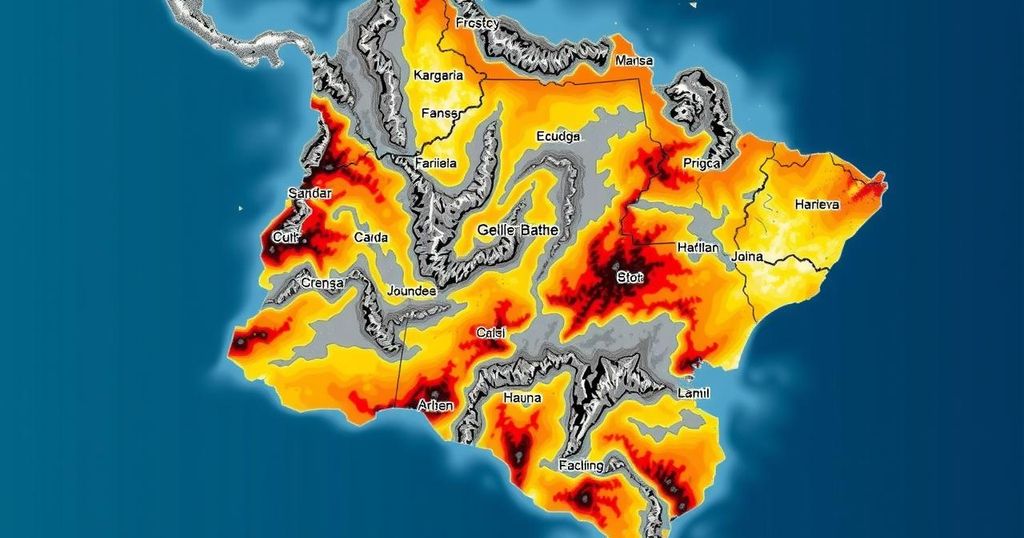Ecuador is experiencing its most severe drought in 60 years, compounded by extensive wildfires attributed to both climate change and human actions. The country faces critical water shortages affecting energy production, leading to rolling electricity cuts. Citizens are frustrated with the government’s mismanagement amid this crisis, highlighting the need for systemic solutions that address both local and global environmental issues.
Ecuador, a nation recognized for its rich biodiversity, is currently enduring its most severe drought in six decades, compounded by extensive wildfires that present a significant threat to its environmental heritage. This phenomenon has been exacerbated by a combination of climate change and human intervention, signaling a troubling confluence of ecological challenges. The country’s geography, characterized by a variety of microclimates across its four main regions, complicates the predictability of seasonal weather patterns. Coastal areas experience humid conditions, while the Amazon rainforest features tropical climates, and the Andean region sees drier weather during certain months. Unfortunately, recent environmental factors, including elevated UV radiation and the consequent increase in wind speeds, have contributed to intense forest fires, further straining Ecuador’s rich ecosystems. The adverse effects of climate change have been acknowledged in national discussions, particularly during the 2023 presidential elections, where candidates underscored the importance of drought prevention for ensuring domestic energy needs. However, these fires are being attributed in part to human actions, with officials such as Quito’s Mayor Pabel Muñoz labeling them as “criminal and terrorist.” This sentiment is echoed by many citizens, including student Alejandra Baca, who expressed her frustration at the inability to help those impacted. On the other hand, law student Felipe Rivadeneira pointed to the ineffective emergency management from local authorities as further complicating the situation. As rainfall has been absent since earlier this year, Ecuador’s essential water reservoirs and agricultural productivity have significantly diminished, leading to a critical energy crisis. With hydropower constituting 70% of the nation’s energy supply, the government has resorted to implementing regular electricity cuts since September 18th as a means of rationing power. Rivadeneira noted the severe consequences of these shortages, particularly for those reliant on electricity for their livelihoods, contributing to increased frustration over mismanagement. Despite criticism directed at the government, it is essential to recognize that the longer-term issues of climate change are a major contributor to these crises. Professor Janice Harvey highlighted the disconnect between the immediate problems of drought and wildfires and the underlying global climate forces at play. She pointed out that the failure to link these events creates additional stress for citizens, emphasizing the necessity of comprehending this as a systemic problem rather than viewing each issue in isolation. In summary, Harvey advocated for accountability from industrialized nations, which have historically contributed to climate change through extensive fossil fuel consumption, thereby placing undue burden on economically vulnerable countries such as Ecuador. Addressing the core causes of these challenges through an effective climate change policy is imperative to alleviate the impacts faced by nations contributing minimally to the global problem.
Ecuador is recognized for its extraordinary biodiversity, ranking as one of the most megadiverse nations, yet it currently confronts its worst drought situation in 60 years, alongside rampant wildfires. Geographically diverse, the country’s various climates exacerbate the difficulty in anticipating weather patterns, which has led to significant ecological disruptions. The role of climate change in intensifying these circumstances has been critical, though human-induced factors also play a significant role, impacting both the environment and the daily lives of Ecuadorian citizens. Recent trends indicate a correlation between climate change and mismanagement in handling these ecological crises, leading to severe socio-economic consequences.
Ecuador is grappling with unprecedented drought and wildfire disasters exacerbated by both climate change and human activity. The failures of local governance in managing these crises, coupled with the broader implications of global climate change, have placed immense stress on the country’s socioeconomic structures. It is paramount for both local and global entities to address these issues collectively, holding accountable those responsible for the deteriorating environmental conditions, to craft effective strategies that mitigate future crises.
Original Source: theaquinian.net






